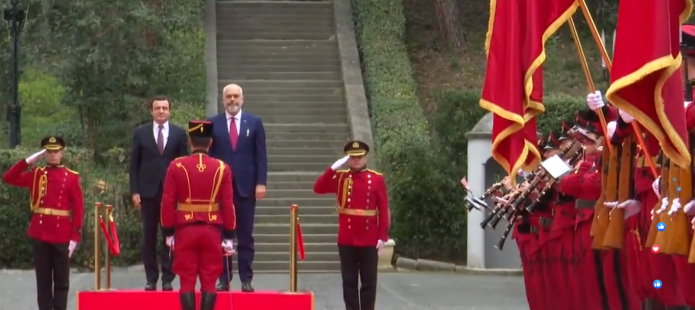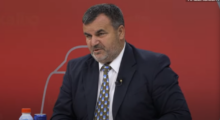Relations between Albania and Kosovo have hit a new low after a German official indicated Berlin’s support for the disputed regional “Open Balkan” project, which Kosovo staunchly opposes.
North Macedonia’s Prime Minister Zoran Zaev, Albania’s Prime Minister Edi Rama and Serbia’s President Aleksandar Vucic met in Skopje last month to launch the initiative, pledging to scrap most border obstacles impeding travel and business between the three states by 2023.
But Kosovo, Montenegro and Bosnia and Herzegovina have hesitated to join the initiative, which originated in 2019 and has been unofficially dubbed a “Mini-Schengen” in reference to the EU’s borderless and passport-free zone.
On Wednesday, a German government spokesman told the Pristina-based news portal Gazeta Express that Berlin believes that “any regional cooperation in Western Balkans is useful”.
“At the same time, it is important that cooperation remains comprehensive and open for the six countries in the region. This is the reason why we support the Action Plan for Common Regional Market,” the spokesperson was quoted as saying.
Hours after, Albania’s Prime Minister took a dig at Kosovo leaders who are opposing the Open Balkan initiative.
“Surprise! Apparently the German government supports the Open Balkan, differently from what is being told to people in Prishtina and Tirana,” he said.
“And not just this, but it [the German government] is also asking for the urgent signature of the Joint Regional Market before the EU-Balkan summit on October 6,” Rama added.
“Germany says Open Balkan should be comprehensive and yes, of course, it should be, so the door remains open, but we can neither include anyone forcefully nor wait until those who are not convinced understand that this is the path to the future,” Rama continued.
From Pristina, Jeton Zylfaj, Kosovo Prime Minister Albin Kurti’s advisor, hotly disputed Rama’s claim.
“Germany does not support the ‘Mini-Schengen’, now turned to ‘Open Balkan’. Germany supports a Common Regional Market as part of the Berlin Process. ‘Mini-Schengen’ is an unnecessary duplication. Edi Rama, let’s work together on the Berlin Process,” he wrote.
Bosnia and Montenegro say they see no particular benefits from the Open Balkan initiative, as easing travel and trade restrictions are already covered by the wider CEFTA agreement, to which they are party, and by bilateral agreements.
But Kosovo has voiced a sharper, more political objection to the plan, mainly relating to Serbia’s refusal to recognize the independence of its former province, proclaimed in February 2008.
The agreement reached by Zaev, Rama and Vucic envisages cooperation in several areas. In dealing with natural catastrophes, it allows the three countries to cooperate closely not only in prevention, but also in giving and coordinating mutual aid during earthquakes, storms, fires and other disasters.
On trade, unnecessary paperwork will be scrapped and the transport of goods at border crossings speeded up. One idea discussed was opening special fast tracks at border crossings for Balkan citizens so that they have priority.
Unification of labour markets is also envisaged, by more easily issuing work permits for citizens of one country in the other two, mutual acceptance of diplomas and job qualifications, making the work forces more flexible and available and so hopefully attracting more investment.
























